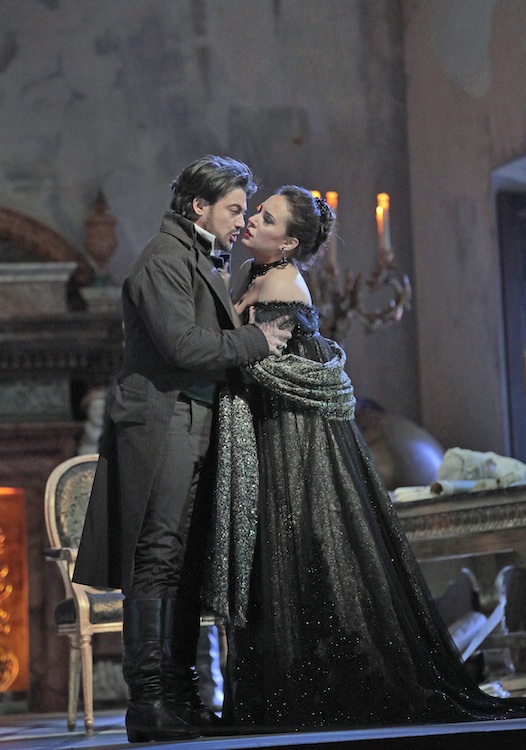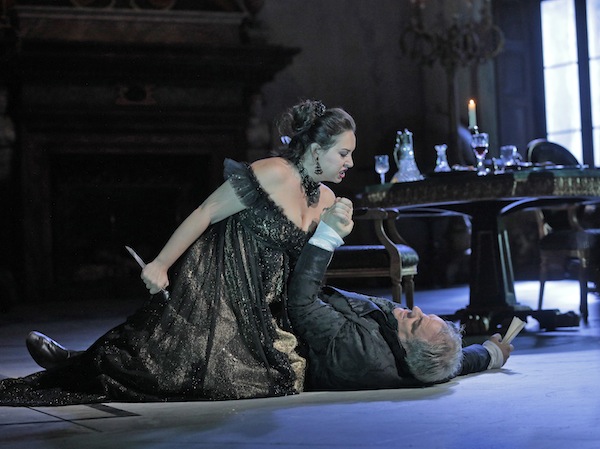Yoncheva triumphs in premiere of Met’s new and dazzling “Tosca”

Sonya Yoncheva and Vittorio Grigolo in the Metropolitan Opera’s new production of Puccini’s “Tosca.” Photo: Ken Howard/Metropolitan Opera
The story was so bandied about that it became common wisdom, even among the non-operagoing public: the Metropolitan Opera’s new Tosca, set to debut on New Year’s Eve, was a fiasco, abandoned by star after star until it barely resembled the grand project originally devised.
In the aftermath, it’s almost tempting to surmise that it was all a brilliant stunt by the company—a major new production by David McVicar, which became the talk of the town for all the wrong reasons, has emerged as a standout triumph of the Met season.
Most of the cast changes so fretted over by the press have been more clarifying than troubling. Kristine Opolais, whose voice has been a cause of concern in recent appearances, was among the first to withdraw, to be replaced by Sonya Yoncheva, whose star has risen with astonishing speed since her company debut in 2013. Taking on the most challenging role yet of her Met career, she was nothing short of brilliant. Her glowing soprano was at its very best in Sunday night’s premiere, focused, colorful, rising to moments of intensity without ever forcing at her top. “Vissi d’arte” was exquisitely crafted, showing beautiful, quiet sadness in the opening phrases before scaling the enormous emotional heights of the aria.
The rest of that Act II scene was, if anything, even more gripping: for so much of the performance, Yoncheva bore herself with a combination of fierceness and composure; to watch her carefully groomed diva Tosca break down in her confrontation with Scarpia, we see her deep despair turn to violent rage, and ultimately to frantic horror at what she had done. After a searing performance like this one, there can be little doubt that Yoncheva belongs in the first rank of stars on the Met’s stage.
Vittorio Grigolo has earned a reputation as the tenor who can’t contain himself, but if he continues to choose his roles so well, that may never become a problem for him. His Cavaradossi is a passionate being; right from the start of “Recondita armonia” he was at full throttle, and in his early scenes with Tosca he could barely keep his hands off her. It was thrilling to see the other side of that passion as the tragedy wore on–Act II saw him as an incensed revolutionary, welcoming his own death by taunting his persecutors. Act III’s “E lucevan le stelle,” at long last, was among the most impressive moments Grigolo has yet given at the Met. When he performed the aria back in May at the company’s anniversary gala, it seemed little more than a showpiece. Now it is a fully realized scene, still showing his trademark clarion tenor, but channeling it towards something truly moving–in this case, an intimate look at the painter’s torment.

Sonya Yoncheva and Željko Lučić in the Metropolitan Opera’s “Tosca.” Photo: Ken Howard/Metropolitan Opera
A late substitute for Bryn Terfel, Željko Lučić suffered more than anyone else from the acoustic effects of the first act: set designer John Macfarlane’s representation of the church of Sant’Andrea Della Valle, recessed deep into the stage, swallowed up most singers unless they were near the apron. For Scarpia in particular, needing to make a booming first impression to establish his fearful persona, struggling for volume in Act I is hardly ideal. Lučić hit his stride in Act II–one of the most brilliant single acts of any opera, for dramatic purposes. His gristly baritone dripped with malice as he presided over Cavaradossi’s torture, but there was no chewing of the scenery: the calm with which he went about his outrages was chilling.
The standout of the supporting cast was the delightfully harried sacristan of Patrick Carfizzi, who brought a voice of rare fullness and color for a comic baritone role. Brenton Ryan, with his smooth tenor, was perfectly detestable as Scarpia’s lackey Spoletta, and Christopher Job was admirable if gruff as the hard-knuckled heavy Sciarrone. Christian Zaremba showed a firm bass in his company debut, though he made for a rather nondescript Angelotti.
Of all the various replacements, perhaps none had a tougher walk-on than Emmanuel Villaume. First this production was to be led by Andris Nelsons, who withdrew along with his wife, Kristine Opolais; then came and went James Levine, whose scandals need no rehashing here.
Villaume gave a rich account of the score in the pit. He drew an impressive array of colors from the orchestra, rising to meet the demands of the opera’s most dramatic moments. The rich burning of the strings after Scarpia’s death in Act II seemed at once an enormous release of dramatic tension and a grim warning of more tragedy to come.
Perhaps the most notable story of all (or at least the longest-running storyline) in this new production is the happy closure, for the moment, of the Zeffirelli-Bondy saga. No one will claim that this is a daring Tosca by contemporary standards, and there were certainly snickers about the idea of replacing the much-reviled Luc Bondy staging with one that so resembled its Franco Zeffirelli predecessor.
Yet that feat could hardly have been better accomplished than by director McVicar and his team: Macfarlane’s new sets are sumptuous, “realistic” in the grand old operatic tradition of visual extravagance. Yet while dazzling and enormous, the staging also feels remarkably fresh: the stylized realization of the Palazzo Farnese creates the perfect atmosphere of gloom for the drama of Act II. The final act gives us a remarkably bleak rendition of the iconic Castel Sant’Angelo.
Most important of all for an opera that so relies on the dramatic collision of powerful characters, McVicar’s work with his actors was superb; for a cast that has gone through so many iterations, the relationships among them were extraordinarily well developed.
At last, the Met has a Tosca that it can bank on again and again in the coming years. And it should: if any piece deserves an unshakeable pedestal in the standard repertoire, it’s Puccini’s Tosca, which on a frigid New Year’s Eve proved the intense and devastating experience it ought to be.
Tosca runs through May 12 at the Metropolitan Opera. Jennifer Rowley sings the title role on January 12. A second cast, starring Anna Netrebko in the title role, with Marcelo Álvarez as Cavaradossi and Michael Volle as Scarpia, opens on April 21. metopera.org



Posted Jan 28, 2018 at 11:44 am by Charlotte Adler
It was the most wonderful opera experience of my life…and I saw it only on Live from the Met in uncomfortable cinema seats!
Posted Jan 28, 2018 at 11:49 pm by Robert Kilzer
I agree with Ms Adler and Mr. Simpson. The youthful passion of the romantic leads was perfect. They were obviously in love because you could hear it in their voices and see it in their acting. I also greatly enjoyed the performance of Mr. Lucic as Scarpia. His performance personified predatory evil. This was truly GRAND opera. Big and powerful…and beautiful. And I too saw it in my local multiplex in a Live from the Met presentation…stadium seating in comfortable seats. And it was sold out!
PS I read both the New York Times’ and New York Magazine’s reviews. I found them so absorbed by the backstory they obviously could not see or appreciate the opera in front of them.
Posted Jan 29, 2018 at 5:44 am by Fred
It was a wonderful performance! Keep it on your programme MET!
Met Live maybe better than Met on site. More details can be enjoyed.F&A
Posted Jan 29, 2018 at 6:54 am by Adam Kellett-Long
I too saw this great production from an admittedly comfortable cinema seat. The second act was an unforgettable experience, perhaps the best I have ever seen in 35 years of opera-going. And I think for once that the cinema audience might have gained from that in the theatre, as Yoncheva’s rage and fury combined with sadness were superb in close-up. A great actress with a superb voice.
Posted Jan 31, 2018 at 8:15 pm by Paul Plotnick
It’s about time the Met brought back a classic rendition of one of the opera masterpieces. The Bondy version was a sleazy disgrace. You tinker with these works of genius at your peril. I did not mind La Traviata or the updated Falstaff, but Rigoletto in Las Vegas? With an Arab no less intoning the classic Italian mal’occhio? And Gilda being sheltered? In Vegas? Ridiculous.
Posted Feb 17, 2018 at 5:22 pm by Jill Flyer
Best Tosca I have ever seen. I have seen a black and white version of Maria Callas doing her signature role and frankly, Yoncheva was better. And of course the settings were unbelievable and Lucic as Scarpia was soooo truly menacing. All were in super voice. One of my most memorable operas I have seen (and I used to have season tickets at the Lyric Opera in Chicago for many years). AND I saw it in Guadalajara, Mexico at the live transmissions from the Met.
Posted Feb 17, 2018 at 7:50 pm by Irena Nikolova
This is one of the most dramatic renditions of Tosca I have seen. Sonya Yoncheva’s beautiful and powerful voice and her superb acting made those of us in the audience surrender to the gripping drama enacted by Tosca. Yoncheva and Grigolo bring a youthfulness to the staging of the opera, which is both refreshing and tragic. An outstanding performance of convincing dramatic power and elaborate theatrical details.